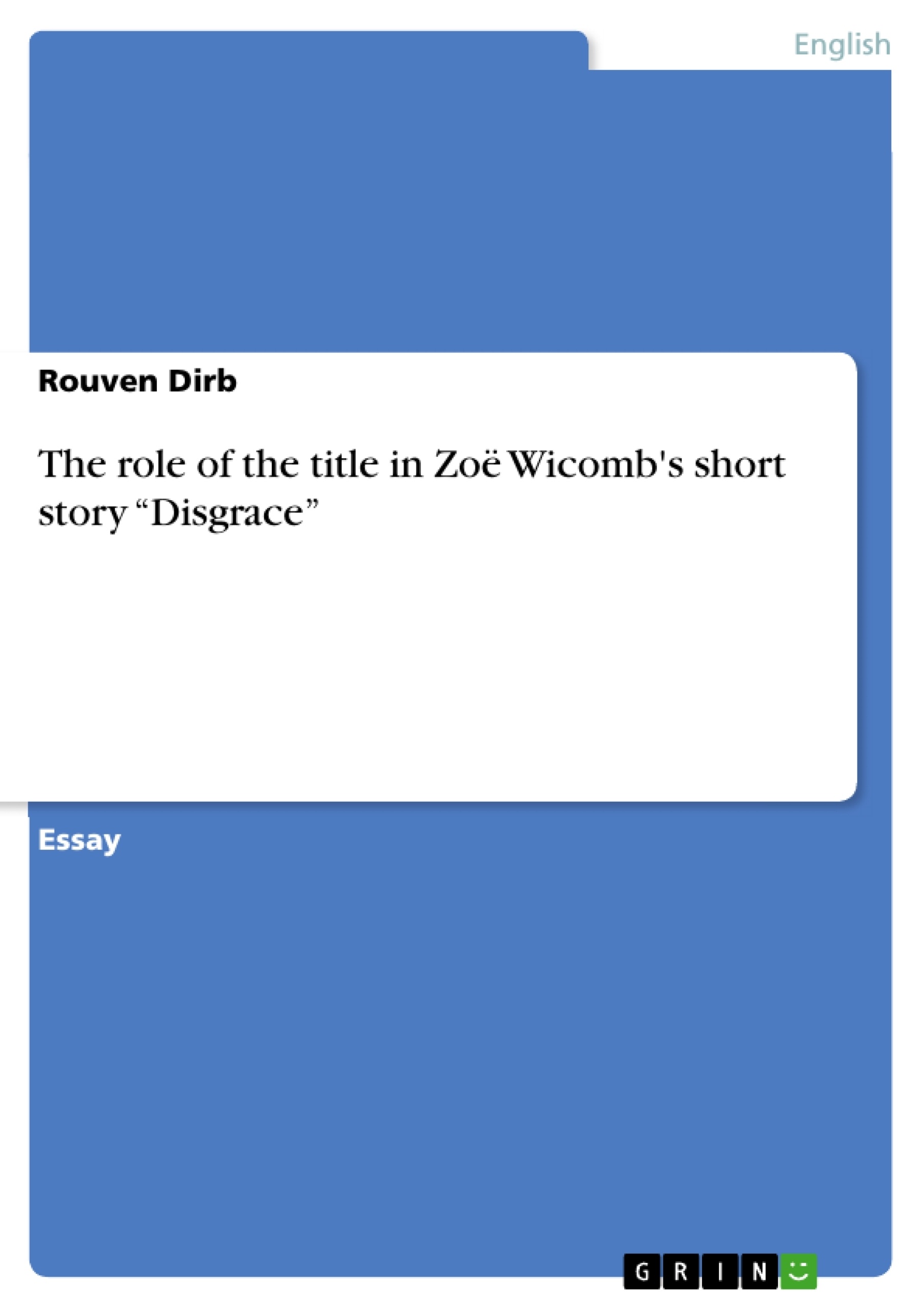Excerpt
The role of the title in Zo ë Wicomb's short story “ Disgrace ”
“Disgrace” is a short story by South African author Zoë Wicomb featured in her cycle “The one that got away”, first published in 2008. It is the story of three elder women in South Africa. The first woman, who is introduced in the short story is named Grace and gives the story its title. Grace is a housekeeper at the house of Shirley Haskins in Cape Town, an Englishwoman, who has presumably emigrated to South Africa, though it is never said explicitly. The third woman mentioned in the short story is Fiona McAllister, a Scottish woman, who has traveled through South Africa and is a close friend to Shirley Haskins. The narrative in the short story is a 3rd person narrative with an authorial voice and a shifting focalization between Grace and Fiona McAllister.
The topic for my essay is the importance of the title, which is a common theme throughout the short story. Based on the name of the story, which is clearly linked to the character Grace, it is safe to assume that Wicomb has chosen these two names deliberately as a wordplay. The story can be read quite literally as the disgrace of the character Grace who steals a scarf from Fiona McAllister. Nevertheless this is just the superficial reading and a more psychological layer to the story can be observed. I will come back to that point later in my essay.
As I mentioned above, Wicomb plays around with the word grace and its word family. Taking the title and the character's name aside, words like “ ungracious ” (p. 25), “ ungrateful ” (p. 27) as well as the added title “ Miss ” (p. 26) to Grace's name, making it “Miss Grace ” , can be found. It is very interesting to see that these words that are found within the text have a negative connotation. “ Ungracious ” as well as “ ungrateful ” contain the prefix “ un- ” turning them into the opposite, the negative side, of the root word. “ Miss Grace ” is slightly different than the two examples mentioned before, because it is not a composite. There is no such word as “ misgrace ” , but if we have a look at the word “ miss ”, which is a synonym for “ fail to achieve ” , it is obvious that it has the same negative connotation than the two other examples. As readers we can play around with the term “ Miss Grace ” as well. If we take the name and make a verb out of it we get “ to miss grace ”, which tells us that Grace has had the chance to be “graceful ”, but did not manage to achieve it. Concerning the plot of the story it is important to say that there are two ways of interpreting the title of the story, thus making the story ambiguous. As I mentioned above, Grace's 'fall from grace' is easy to see while reading superficially. Grace's thievery of Fiona McAllister's scarf is her disgrace. She steals the scarf without hesitating.
“ Her fingers catch on a pile of pink jersey - lovely stuff, soft as a baby - which in turn yanks to the surface the swirling blues and greens of a scrap of silk. Then the world grows miraculously still. As if mesmerized, she tugs at the fabric, watches it snake through the tangle of garments as she lifts it out of the bag. Grace rises, holds the scarf in both hands, runs it through her fingers, and in the glorious silence hears the swish of silk, the rush of water, of the tide foaming over shiny wet boulders. Her fingers work deftly; they fold the fabric into a small square and slip it into her pocket. ” (p. 34 - 35).
This act can be interpreted as an act of malevolence, because she does not hesitate for one moment while she steals the scarf. She sees it, she likes it and she takes it. She begins to question her deed in the same night, asking herself what to do now “ She is still awake at midnight, amazed by the woman who has taken a silk scarf that does not belong to her, and wonders what to do. ” (p. 35). Interesting about this quote is the fact that she can not sleep and is being haunted by her conscience for the first time. She is “amazed ” (p. 35) by her ability to steal the scarf. Further on, she justifies her deed to herself by pointing out what she did for Fiona McAllister “ It is hers [Grace's] ; she is entitled to it; did she not hand-wash the woman's silk shirts, change her bed, polish her floor? ”
- Quote paper
- Rouven Dirb (Author), 2011, The role of the title in Zoë Wicomb's short story “Disgrace”, Munich, GRIN Verlag, https://www.grin.com/document/182846
Publish now - it's free






















Comments